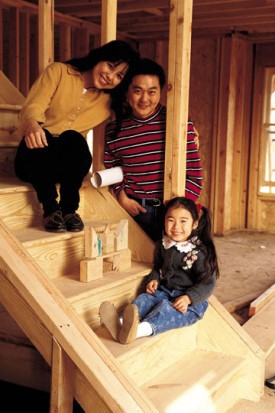|
Buying a New Home
What are the pros and cons
of buying a brand new home?
What a joy it would be to
own a home that required little, if any, maintenance for
5 or 10 years. This is a major attraction of buying a
new home. There's no need to fuss with remodeling and
repairing. You simply move in and enjoy. That is, unless
you have the misfortune of buying a lemon.
Several years ago, a couple
bought a new home in a small development in Marin
County, Calif. They thought they'd lucked into the home
of their dreams until one house after another in the
project developed similar problems. First, the windows
and skylights leaked. Then, the drainage systems failed.
Finally, water seeped through some exterior walls. The
only recourse was to sue the builder. He, however, had
fallen into financial hard times soon after building the
development.
New homes are usually built
with approval of the local building department. This
involves a building permit application process including
such requirements as a soils report, architectural plans
and structural calculations.
Licensed professionals -
soils engineer, architect, and contractor - are involved
in creating a new home project, which is inspected by
city building inspectors during the course of
construction. At the end of the project, a certificate
of occupancy is issued.
You might expect that with
all this planning and scrutiny, new homes would be
perfect. But, just because a home is new and built with
permits doesn't mean that it was properly built, or that
it's free of defects. Sometimes builders make mistakes.
City inspectors aren't infallible either, and they are
usually immune from liability.
Many homes built after the
Oakland Hills firestorm in 1991 developed costly dry-rot
problems within several years after they were completed.
The culprit in most cases was lack of adequate
ventilation. City building inspectors had inspected and
approved all the homes during construction.
HOUSE HUNTING TIP:
Don't assume that because a city inspector looked at
the property during construction that you don't need to
have it inspected. You should include an inspection
contingency in your purchase agreement, regardless of
the home's age.
It's best to have a new home
inspected by a home inspector who has experience
inspecting new homes. You may want to have an engineer
evaluate the soils report, plans and structural
calculations for you.
In addition to inspecting
the structure, make sure that you investigate the
builder's reputation. You want to buy from a builder who
values his good reputation and will promptly take care
of any construction-related problems that might surface
in the first year or so of ownership.
Ask the builder for a list
of homes or developments that he has built in recent
years. Visit these. How do they look? Speak to some of
the homeowners to find out how satisfied they are with
his product. Be sure to ask how the builder responded to
requests to take care of problems.
Ask the builder to give you
a written warranty, which states that he will repair
construction defects that develop within your first year
or so of ownership. Some builders won't do this. Also,
the law is not always clear about what a builder's
responsibilities are to you. Consult with a
knowledgeable real estate attorney if you have any
questions about a builder's responsibilities.
Older homes need updating,
they often aren't energy efficient, and they may be
poorly designed. Renovating is expensive and
time-consuming. But, a benefit of buying an older home
is that it has stood the test of time.
THE CLOSING:
You should exercise diligent care in buying a new home.
Article
written by Dian Hymer
Dian Hymer
is author of "House Hunting, The Take-Along Workbook for
Home Buyers," and "Starting Out, The Complete Home
Buyer's Guide," Chronicle Books.
Distributed
by Inman News Features |